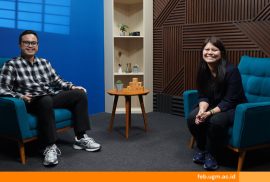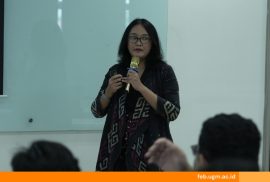Transitioning from high school to university is among the most challenging for new students. Cultural and environmental differences often cause adjustment difficulties that affect academic performance and mental health, especially in the first semester. So, how can students achieve a balance between study and life?
To address this issue, the Career and Student Development Unit (CSDU) of FEB UGM, in collaboration with KarirLab, organized a soft skills training entitled “Achieving Study-Life Balance for Optimal Performance and Well-Being”. This training was held in person at Auditorium Pertamina Tower and Auditorium Learning Center for two days on October 8 and 9, 2024.
The training featured Sandiya Prabaswara, a clinical psychologist, who shared various strategies and tips on how students can achieve a work-life balance. Sandiya emphasized the importance of balancing academic and personal life, especially for new students. The first step is understanding yourself and realizing that stress is not always negative.
“Knowing yourself is part of reflection and self-awareness. Also, stress is not always bad,” said Sandiya.
She distinguished between positive stress (eustress) and negative stress (distress). Eustress motivates people to perform better, such as when they feel compelled to study for an upcoming exam. On the other hand, distress lowers performance and affects mental health, such as when facing a difficult exam and feeling overwhelmed and demotivated. “But it’s important to remember that stress affects everyone differently. What one person finds stressful may not be for another. This is normal because the causes of stress are different for each individual,” she added.
Sandiya explained the study-life balance as the balance between academic and personal life. This can only be achieved if one can prioritize and allocate time proportionately. “Balance means that the different elements of life are positioned proportionally, based on our priorities and needs. It means knowing when to rest and study,” Sandiya explained.
She also emphasized the importance of maintaining a study-life balance to help students better manage their energy. With the right balance, students can develop healthy and sustainable study habits without feeling overwhelmed by excessive stress. One way to achieve this balance is through physical and mental self-care.
Sandiya shared self-care tips such as recognizing personal needs, identifying stressors, developing strategies, and starting with small steps. However, she emphasized that self-care strategies are different for everyone. “What works for others may not work for us, and that’s okay because everyone experiences different types of stress,” she explained.
She also offered tips for balancing academics and life, including creating daily schedules, breaking large tasks into smaller ones, using online learning methods, allowing extra time to complete tasks, and practicing self-care. In addition, she introduced two methods for time management and goal setting: the SMART method (Specific, Measurable, Achievable, Relevant, Time-bound) and the Eisenhower Matrix (Urgency and Importance).
The soft skills training is part of FEB UGM’s commitment to supporting students’ academic success and fostering a healthy campus environment. Through this training, it is hoped that FEB UGM’s incoming students will be able to balance their educational and personal lives, allowing them to grow as healthy individuals, both physically and mentally.
Reportage: Najwah Ariella Puteri
Editor: Kurnia Ekpatiningrum
Sustainable Development Goals








